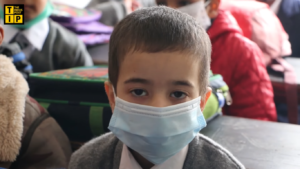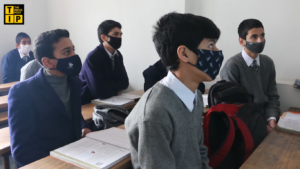While the Covid-19 pandemic has changed the course of life, it has particularly thrown up a new challenge for teachers in Kashmir.
With the educational sector being the worst-hit by the pandemic, the teachers have a mammoth task at hand as students have returned to classes after more than 30 months and are increasingly finding it difficult to abide by rules. Teachers say they are noticing a behavioural change among students.
A teacher at SSM Higher Secondary School in Srinagar, who did not want to be named, said students were facing behavioural changes on a large scale.
“Education can be imparted in homes too but in schools there is a different environment in which the students are groomed. Ever since schools have reopened, we are focusing on disciplining the students,” she said.
She said students had forgotten basic etiquettes and teachers were working on improving it.
Another teacher, Showkeen Ahmed Mir, said it was a challenge to teach post the pandemic as students were showing less interest in studies.

Mir, who teaches at HISTA Higher Secondary School in Anantnag, said: “When I take classes, I don’t see much behavioral changes in students but they do not seem as interested in studies as they were in the pre-Covid times.”
Many parents agreed with teachers over the change in behaviour among students, but said things were improving as students had started going to school again.
Riyaz Ahmed Bhat, a parent, said during quarantine, children had become unmanageable and uncontrollable, but since the reopening of schools they were witnessing a slight improvement.
“They wouldn’t listen to their parents and had got temper issues. They used to get annoyed easily. As they have started going to school again, their behaviour has got a little better. We are able to see a positive change,” Bhat said.
Another parent, Shabnum Javed, whose daughter is in Class II, said she was worried about her child’s health since the reopening of the schools.
“I am happy that my daughter is learning new things but the school routine is taking a toll on her behaviour. As she was used to the online setup and the comfort of her home, the sudden shift, long school hours, a lot of homework and no play has made her aggressive. She gets irritated by almost everything,” Shabnum said.
Ishtyaq Bhat, principal of Caset Experimental School, Srinagar, said students lacked writing and reading skills and had got addicted to mobiles, affecting their behaviour.

“During checking recently, we seized around 60 mobile phones from students. They were playing games on their phones in school. When we contacted their parents, they said their children were addicted to mobile phones,” Bhat said.
Clinical psychologist Dr. Wasim Kakroo of the Centre for Mental Health Services Rambagh, Srinagar, said the behavioural change in students was expected as they had attended in-person classes after more than two years, affecting their mental health.
“This stagnation and overexposure to the screen has made them irritable,” Dr. Kakroo said.
He said to overcome this problem, parents and teachers needed to work together and take help from mental health professionals.
“Children at different age levels should be involved in co-curricular activities. Teachers and parents should help students in stress management, anger management, life skills management, time management and in being assertive. They need to work on aspects of positive mental health,” he said
Dr Kakroo said teachers need to be educated and should stop building pressure on students as the pressure game would only ruin things and affect their academics and overall mental health.

However, despite the challenges which the pandemic has posed, students are upbeat about attending school after more than two years.
Anees Farooq, a Class XII student, said he enjoyed being back in school and interacting with teachers and students.
“It feels like coming home after a long time, we study and enjoy. Being in school is much better than taking online classes,” said Anees.
The administration decided to reopen schools in the last week of February following decrease in the Covid-19 infections in Kashmir.
The educational institutions were shut in March 2020 after a nationwide lockdown was imposed to stop the spread of the coronavirus.
The schools were shut in the Valley on August 5, 2019, when the erstwhile state of Jammu and Kashmir was put under a lockdown after being stripped of its autonomous status. The schools were opened for a brief period in 2020 before they were closed again in view of the pandemic.
















